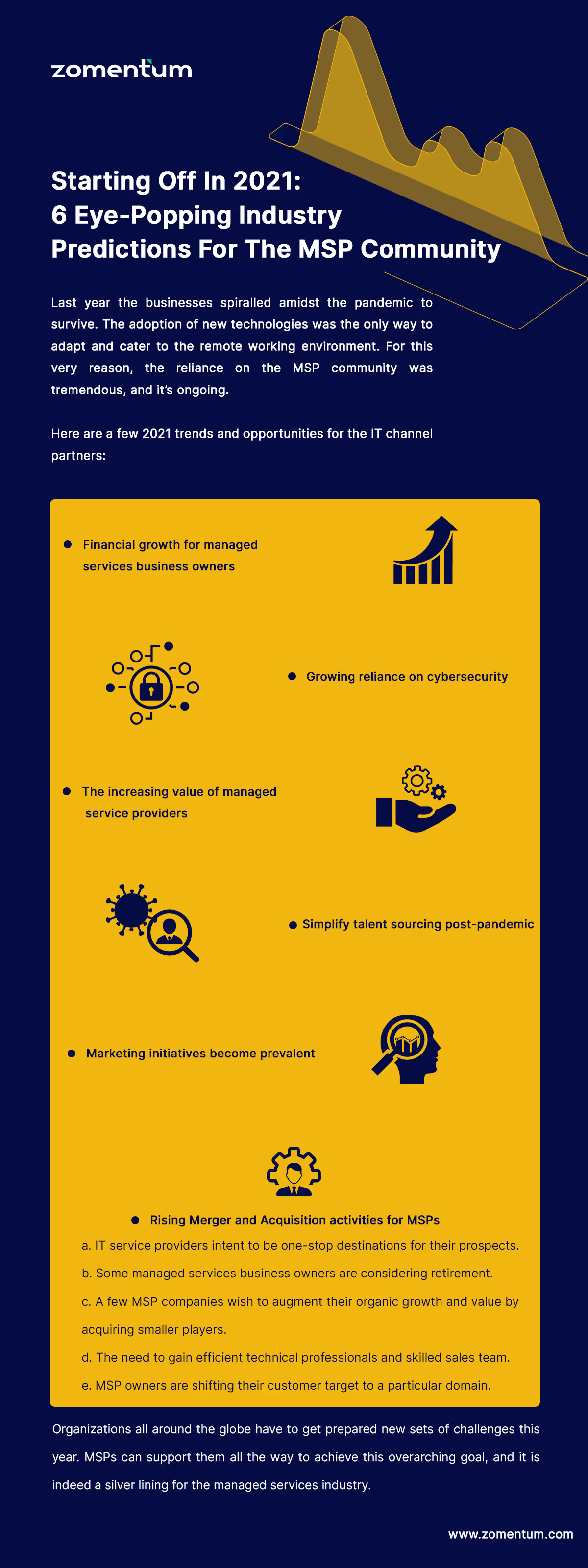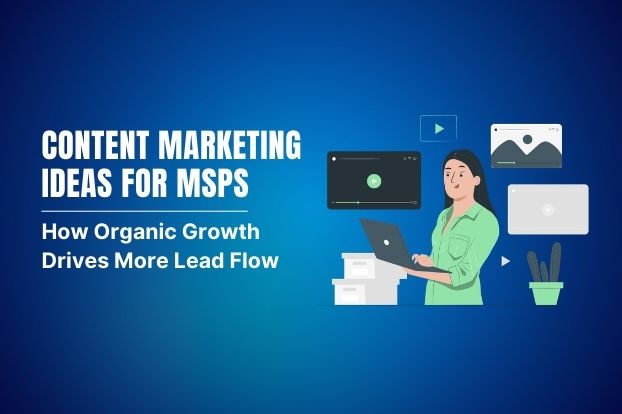6 Eye-Popping Industry Predictions For The MSP Community

2020 was overwhelming for the world as businesses struggled to stay afloat when the pandemic had hit them hard. The eminent health crisis and a sudden shift to working remote forced companies rethink how to stay agile and lean.
The fact that organizations need to adopt new technologies to adapt to this changing landscape is quite evident. Also, hiring experts for every new technology isn’t feasible on a monetary level.
The managed services industry is helping global companies acquire the expertise to deal with these innovations, thereby adding more value and keeping costs and employee agility in mind. This pattern will continue in 2023 as there is no certainty when (or if) things will return to normal for many businesses.
There are several new MSP trends and opportunities that will likely come to fruition this year. Let’s take a look at those inclinations.
1. Financial growth for managed services business owners
The Global Managed Services Market report 2021 suggests that the MSP market, which was valued at $155.91 billion in 2017, will reach $296.38 billion this year. This growth indicates that managed services and MSSP firms will experience a rise in annual recurring revenue. As more and more businesses start to invest in cloud services, automation, and IT upgrades, demand for these companies’ services will continue to soar.
Another important aspect is that businesses are shifting their IT financing model away from capital expenditures to operational costs, contributing further to the MSP market’s growth.
2. Growing reliance on cybersecurity
With remote working comes higher risks. Amidst the COVID19 pandemic, cyber crimes have grown significantly, with the target shifting from individuals and small businesses to major corporations, governments, and critical infrastructure. Therefore, companies and their service providers must refocus their cybersecurity initiatives in 2023.
This reliance on data and network protection will be a blessing in disguise for the service providers who can use different ways to extend security. Some of the popular cybersecurity services would be Patch management and updates, Antivirus, Backup and disaster recovery, Firewall monitoring and updates, spam filtering and several more.
3. The increasing value of managed service providers
Most companies understand that early adoption of new technologies can help them stay ahead of the competition. However, the need to comprehend all the fine details of SaaS applications and cloud security and remain competent in migration projects can be a roadblock. Hiring and training staff to gain such insights is costly and time-consuming, and even if they decide to attempt to go that route, more agile competitors can leave them behind in that race. Smart businesses will increasingly look to MSPs to provide back up or serve as the primary IT experts.
4. Simplify talent sourcing post-pandemic
Before COVID19, there was a shortage of technical talent in the MSP industry. However, this scenario changed drastically over the past year due to staff reductions, pay cuts, and small business failures in specific sectors. Those developments should make it easier for MSPs to recruit skilled technical professionals to enhance their teams in 2023.
5. Marketing initiatives become prevalent
Most MSPs realise that generating qualified leads for their business is not easy, especially amidst the pandemic. Many may rely extensively on referrals from their existing clients, but they might not reach their MRR goals just utilizing that methodology alone. For those MSPs, 2023 will be the right time to start ramping up online marketing efforts. That process includes defining their ideal customer and connecting online, publishing informational content relevant to their businesses, and following up with those audiences.
6. Rising Merger and Acquisition activities for MSPs
A recent IT Glue survey report shows that 69% of MSPs are considering being acquired, and 19% are considering being purchased by a peer. Some of the key reasons behind this trend include:
- IT services providers wish to be one-stop shopping options for their clients, from delivering essential IT maintenance support and cloud solutions to cybersecurity and application integration.
- Many managed services business owners are approaching their late 50s or 60s and considering retirement.
- Some leaders of managed services companies simply want to augment their organic growth and increase their business value by acquiring other MSPs.
- MSPs are trying to gain valued technical professionals and skilled sales teams through acquisition of other companies.
- MSP owners are shifting their customer targets to a specific domain and wish to excel in it by mergers and acquisitions.

The uncertain business environment in 2023 will certainly affect many of these trends and create new scopes and challenges for MSPs.In this ever-evolving technology scene, organizations that prepare for all the potential challenges that could be thrown their way will advance. MSP support is a must for every fast-scaling business. Even with all the uncertainty about when the pandemic will come to an end and if things will return to normal, service providers have a lot of reasons for being optimistic.
Suggested Blogs

Content Marketing Ideas for MSPs: How Organic Growth Drives More Lead Flow
.jpg)
10 Best Quoting Software Tools for MSPs and IT Service Providers

